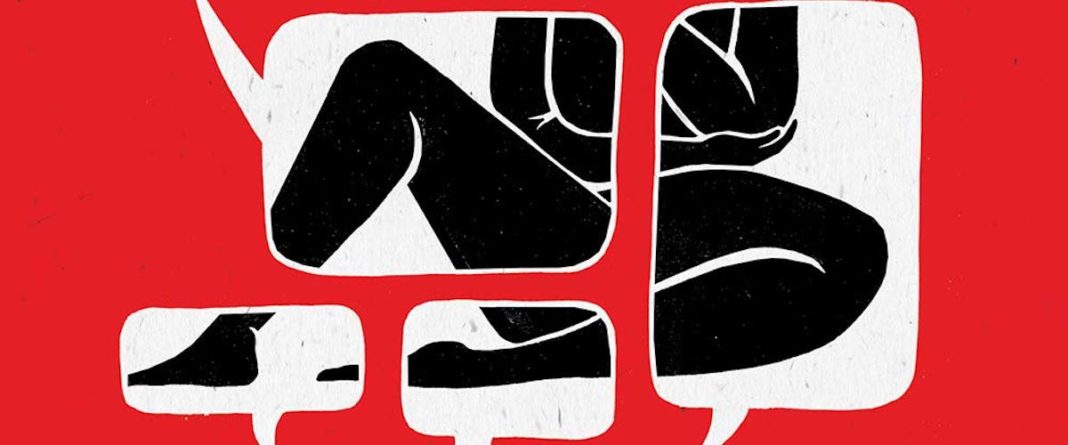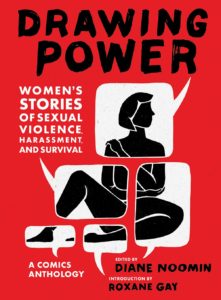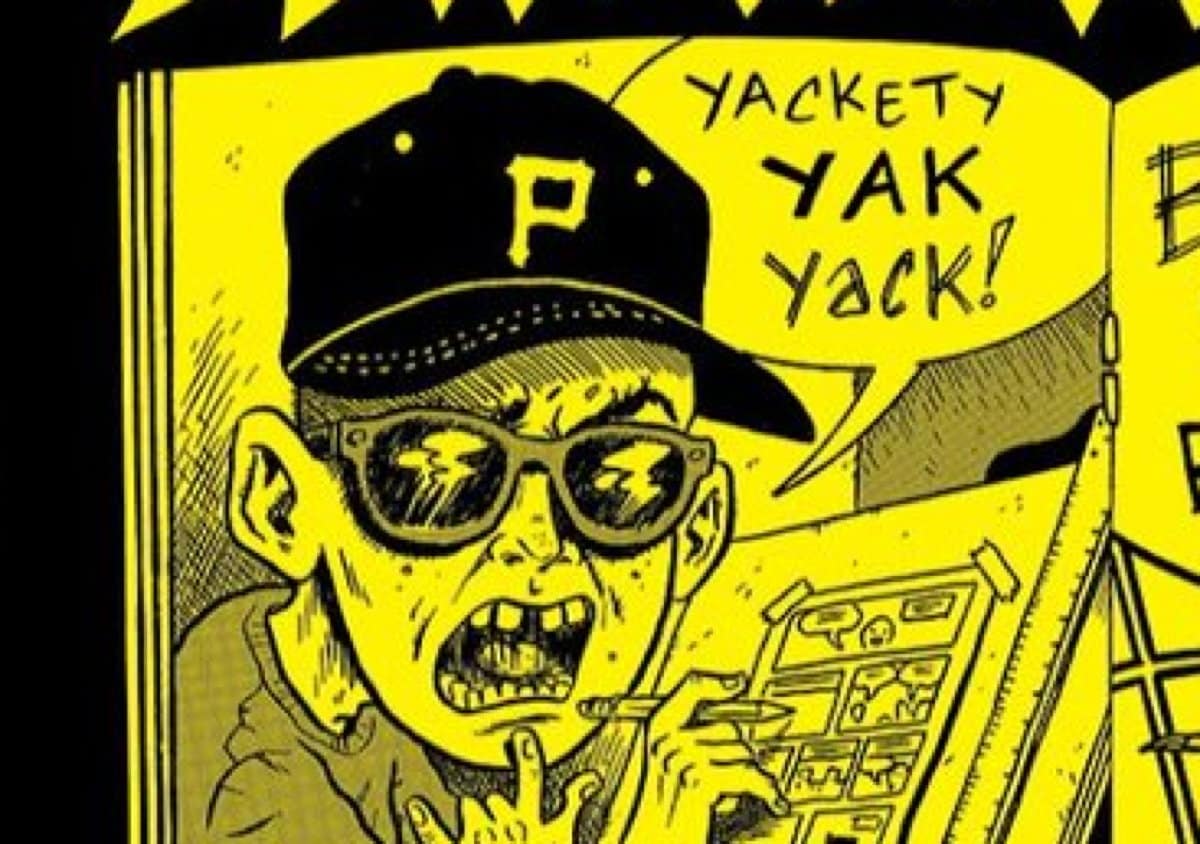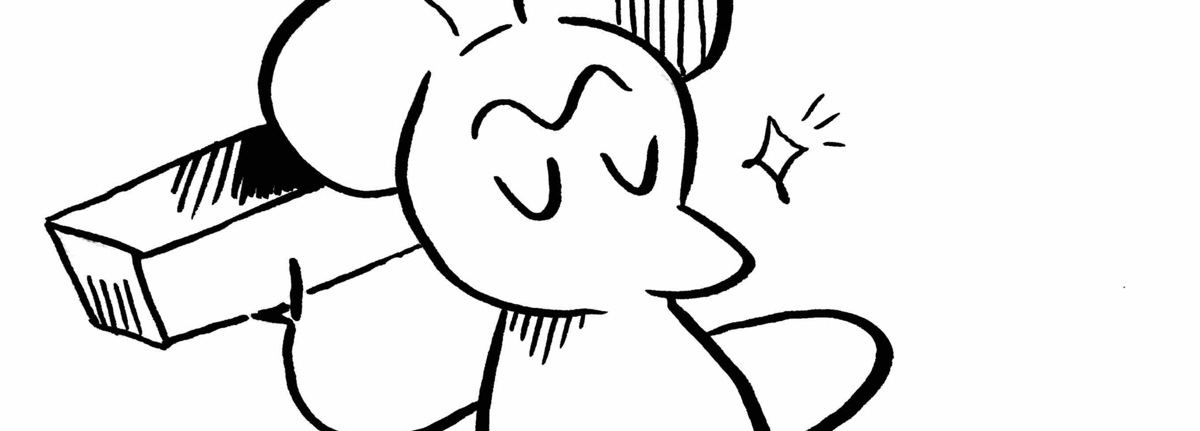 Drawing Power
Drawing Power
Editor: Diane Noomin
Introduction: Roxane Gay
Publisher: Abrams ComicArts
Content Warning: Drawing Power depicts explicit instances of sexual violence, as experienced by the contributing cartoonists. This review also discusses assault and harassment, sometimes in detail.
When Tarana Burke‘s Me Too movement became a viral hashtag in 2017, it felt like a fever dream. In the last two years, a number of powerful men have been made to face consequences for their inappropriate and violent actions, in a slow but steady turning of the tide in western culture. While it’s true that there are plenty of predators still in positions of power — look at the White House — there are far fewer than there were just a few months ago, and that’s encouraging. But as editor Diane Noomin notes in Drawing Power, predators aren’t just high-powered white men; they’re everyday people who prey on children, teens and adults, and they are everywhere.
Dedicated to Anita Hill and with an introduction by Roxane Gay, Drawing Power features stories by 64 cartoonists about their experiences of sexual violence and survival. As noted above, several of these stories are explicit and detailed, which can be difficult to read, especially as a fellow survivor. However, these comics also shed light on the complexities of identifying and surviving sexual violence, as well as the coping mechanisms we establish in order to move on.
All 64 comics in this collection are vital and deeply affecting, but here are just a few that stood out in particular:
- Ebony Flowers examines power in numbers when she seeks the safety of another woman after a male co-worker attacks her in Mr. Stevenson.
- Cathrin Peterslund recounts being approached by a strange man one night while she was waiting for a train in The Smell Of Your Hair. When he sat beside her on the train and began playing with her hair without her consent, she attempted to appease him until she could be free of the situation and the danger it posed.
- In Superglue, Joamette Gil recounts how even though her mother tried her best to keep Gil safe from men who would harm her, it didn’t work — but it’s not Gil’s fault, nor is it her mother’s.
- Meg O’Shea recalls the time she was fetishized at a party for her race, something she thought could never happen in real life, in Asian Girls.
- Carta Monir‘s Ready to Pop depicts paternal abuse, intimidation, and control, demonstrated through the violation and violence of 1) forcing a teen to leave the door unlocked when showering and 2) force-popping pimples on that teen’s back while both parties are naked.
- In Don’t Worry Ma’am, I Am Just a Friend, Lena Merhej confronts the problem of street harassment and how it feels socially sanctioned.
- Soumya Dhulekar plays off attempted rape as a joke in Last Night Was So Funny, which feels all too familiar — and that makes it all the more horrifying.
- Sarah Firth recounts intense workplace harassment in Sausage Fest, and how she learned that she wasn’t the first woman in her position to be pushed out of her job because of the men who worked there.
- In How Cartoons Became My Friends… Again, Emil Ferris explains how she uncovered repressed memories of being assaulted while watching a Mr. Magoo cartoon special as a kid, which made it nearly impossible for her to make comics for decades because of associated trauma.
Several comics deal with how commonplace sexual violence can be, and how it can take on dozens of forms. These include Liana Finck‘s Drawings, Katie Fricas‘ …Let Me Count the Ways, Marian Henley‘s The Verdict, and Nicola Streeten’s Always There, among others.
A recurring theme throughout the comics in Drawing Power is shame surrounding in-the-moment reactions. Women are frequently taught not to anger men, to deescalate situations that make them uncomfortable, to “go along with it” for our own safety. Thus, even when we are violated or attacked, we fall back on these teachings, which can make us feel complicit in the violence enacted upon us.
Another recurring theme is the drawing of power not just from literally drawing these experiences, but from putting names to them and saying, “No. This was not OK.” Regaining power after it has been stripped from you is a tall order, and sometimes it feels impossible; in Drawing Power, several different avenues of accomplishing this task are explored, which sheds light on the fact that not every victim is the same; not every coping mechanism works for everyone; and furthermore, no one can tell another person how to heal, as it is a deeply personal and private journey for each of us.
As Gay writes in her introduction, “There are no easy comics to be found here. The comics in these pages will make you think, make you feel, make you laugh, make you rage.” She adds, “Each of these artists wields the power of testimony, the power of using their visual voice, the power of drawing their truths. By using the power of drawing, they show us the condition of the lives they have lived, the condition of our culture, and the vital work we must do to render the need for an anthology like this obsolete.”
In the preface, Noomin also notes that out of all of the women she approached for this anthology, only one said she had never had such an experience. In the time that it took to put the anthology together, one contributor was raped and another had to drop out of the project because her accused rapist sued her for millions.
Noomin writes, “The patriarchal mindset that leads to sexual violence against women is insidious and startlingly pervasive. … The artists in this collection present themselves not as victims but rather as truth tellers, shining light on the dirty secrets of abusers.”
Drawing Power is as stunning as it is enraging. The anthology is available in hardcover and e-book from Abrams ComicArts on Tuesday, Sept. 17. A percentage of the profits will be donated to the Rape, Abuse & Incest National Network (RAINN).
The National Sexual Assault Hotline is available 24/7: Telephone: 800.656.HOPE (4673). Online chat: online.rainn.org Español: rainn.org/es.



 Drawing Power
Drawing Power




An antidote to stuff like SIN CITY and KICK-ASS, which present sexual violence as entertainment?
Comments are closed.